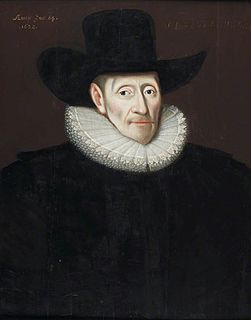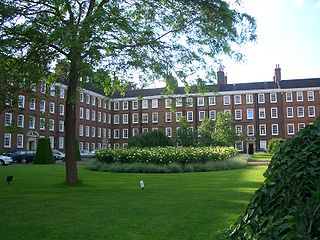
John Erskine, Earl of Mar was a Scottish politician, the only son of another John Erskine. He is regarded as both the 19th earl and the 2nd earl.

Sion College, in London, is an institution founded by Royal Charter in 1630 as a college, guild of parochial clergy and almshouse, under the 1623 will of Thomas White, vicar of St Dunstan's in the West.
William Capon (1480–1550) was an English churchman and scholar.
William Barlow was an Anglican priest and courtier during the reign of James I of England. He served as Bishop of Rochester in 1605 and Bishop of Lincoln in the Church of England from 1608 until his death. He had also served the church as Rector of St Dunstan's, Stepney in Middlesex and of Orpington, in Kent. He was also Dean of Chester Cathedral, and secured prebends in Chiswick and Westminster.
Thomas Harrison was an English Puritan scholar, a Vice-Master of Trinity College, Cambridge, and one of the translators for the King James Version of the Bible.

Sir Eubule Thelwall was a Welsh lawyer, academic and politician who sat in the House of Commons between 1624 and 1629. He was principal of Jesus College, Oxford from 1621 to 1630.
Richard Rawlins was Bishop of St David's between the years 1523 and 1536.

William Chaderton was an English academic and bishop. He also served as Lady Margaret's Professor of Divinity.
Edward Martin, D.D. was an English clergyman, ejected President of Queens' College, Cambridge, and at the end of his life Dean of Ely.
William Thorne was an English clergyman and orientalist, Regius Professor of Hebrew at Oxford in 1598.
Richard Clayton was an English churchman and academic, Master of Magdalene College, Cambridge and St John's College, Cambridge and Dean of Peterborough.
William Brough was an English royalist churchman, Dean of Gloucester from 1643.
John Harding was an English churchman and academic. He was Regius Professor of Hebrew at Oxford from 1591 to 1598, and President of Magdalen College, Oxford, from 1607. He was also involved in the translation of the Authorized King James Version, becoming leader of the First Oxford Company of translators after the death of John Rainolds.
John Perrin was an English churchman and academic, Regius Professor of Greek at Oxford and one of the translators of the Authorised King James Version of the Bible.
Ralph Ravens was an English clergyman and academic. He was nominated in 1604 as one of the translators for the Authorised King James Version, in the Second Oxford Company, but his status is unclear. It is said that he was substituted, for reasons unknown, and did not actually take part in the project. It has been suggested that the Second Oxford Company, in which Richard Edes had died, had two substitutes, namely Leonard Hutten and John Aglionby. On the other hand, Ravens may have taken part in early meetings as a Greek scholar.
Francis Dee was an English churchman and Bishop of Peterborough from 1634.
Edward Grant was an English classical scholar, Latin poet, and headmaster of Westminster School. He was also the first biographer of Roger Ascham.
Thomas Playfere was an English churchman and theologian, Lady Margaret's Professor of Divinity at Cambridge from 1596.
Basil Becon was an English clergyman based in Kent.
Thomas Braddock or Bradock (c1556–1607) was an Anglican clergyman of the 16th century, Headmaster of Reading School from 1588 to 1589 and a translator into Latin.






